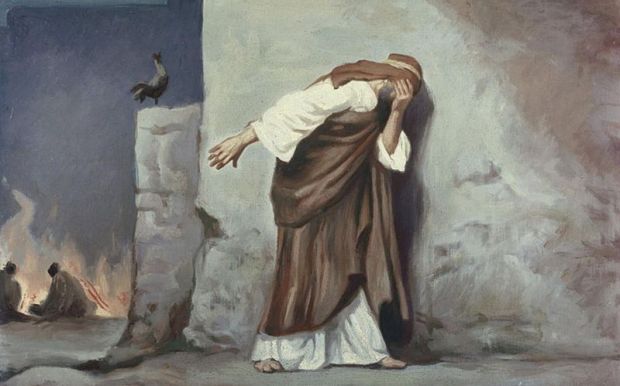Readings: Ezekiel 37:1–14 | 1 John 5:4–10 | John 20:19-31

Text: John 20:19-31
Alleluia! Christ is Risen!
In the Name + of Jesus. Amen.
Everything in the Bible from cover to cover hinges on Jesus Christ. Without knowing His birth, His life, His suffering, His death, and His resurrection, the Bible never quite adds up. From the creation and promised redemption of the first man and woman, to the countless multitude who forever stands around the throne of God, everything depends on what God has done for His human creatures in Christ.

Because of this, what God tells us in the Bible is positively the most important thing for all people to know. Everyone is a descendent of Adam and Eve, and all are corrupted by the same sin. And just as all became sinners through Adam, Jesus Christ is the Savior of all [Romans 5:12-14]. When the Father sent His Son into the world, it was not to help just a select group of people; He has loved every person He has made. Therefore, the blood of Jesus was shed for every single person.
When Jesus rises on that “first day of the week,” this is the message He announces. Every one of His disciples who saw Him preach and teach, suffer and die, He encounters with the outcome of His suffering and death: Peace. “Christ Jesus came into the world to save sinners” (1 Tim. 1:15)and that is exactly what He sets out to do with the marks in His hands and feet, and the spear mark in His side. He goes out proclaiming to the sons of Adam that the gate to paradise has been flung open for them! The seal of the grave has been burst! He has conquered sin and death! For everyone who believes in Him, sin and death are powerless, empty forms of their former tyranny.
This is the glorious news proclaimed in verse 23: “If you forgive the sins of any, they are forgiven them; if you withhold forgiveness from any, it is withheld.” To every sinner who feels their guilt and the weight of God’s anger against their sin, Jesus says, “Your sins are forgiven.” But to everyone who thinks himself better than lost and condemned person, who answers back to God, You fool, you don’t know what you’re saying!, this person has no forgiveness and no peace with God. They remain in their sins and the wrath of God burns against them, because they have despised the very One who freely takes their sin away. Yet, even if that is the case, it is still in God’s heart that such a person turn from their hard heartedness and live!

Jesus lives to breathe life back into to sinners. When God first made mankind, Genesis 2 tells us, “the Lord God formed the man of dust from the ground and breathed into his nostrils the breath of life, and the man became a living creature.”3 God’s breath (which is His Spirit[1]), gave that dust a soul and made him a living being. This is why we confess in the Creed that the Holy Spirit to be “the Lord and Giver of Life.”
But when these souls, Adam and Eve, turned away from God, they asphyxiated themselves from the life He had given them. Their first reaction was to cover their shame with their own work of fig leaves and hide from God among trees. Flash forward to the Upper Room on Easter evening. “The doors [were] locked where the disciples were for fear of the Jews.” They were afraid, so they hid themselves—not just from Jesus enemies, but from God Himself because they all had all betrayed Him by what they had done and left undone. And there’s Thomas too, who made his ultimatum that he would only believe in a Savior he himself could see and touch.
It’s the same thing that we are quick to do when we know we’ve done wrong. We hide ourselves away from God, even though we probably wouldn’t call it that. We lock ourselves away behind the diversions of life like our job, or shopping, or countless things we take pleasure in that keep us from having to look at it. But in our guilt-ridden state, we also—like Thomas—refuse to believe the messengers the Lord sends to bring peace.
This is the double tragedy of our sin. First, that when we know we’ve sinned, we hide ourselves and try to cover up our mess. We use our God-given reason and ability to either patch up or ignore our guilt before God. Second, by trying to deal with our sins ourselves, we show how broken our trust in God is.

But God would not have us stay in this tragic state. The risen Christ passed through the stone that blocked the entrance of the tomb. Despite the locked doors, He appeared in the midst of His frightened disciples. Perhaps even more amazing is when the walls of the hard human heart are penetrated by Him. Yet, He does not force anyone to believe.
The eleven disciples, less Thomas, stood locked away in the Upper Room. They would hear no strange message from the women. They were perplexed at what they had seen at His tomb. They were each ashamed of their part in His death, and they were afraid they would suffer the same as their Lord. Into the prison of sin they had locked themselves in, Jesus enters. He stood among them and said, “Peace be with you.” Through locked doors and numb hearts, the Lord brought them what they needed most. They needed exactly what He had gained for them by His death and resurrection. He gave them the only thing which could truly deal with their sins—the peace of God.
This is the same way He comes to us, when we are guilt-ridden, doubting, and hopeless. Our reaction to our sin and the evil around us is to shut out everything but our own voice and that of the devil: You’ve failed! You deserve to be punished! How could you even think of being in heaven? Heaven is for good people. But into that spiritual nightmare, Jesus enters. He stands in your midst—even here today. He brings you exactly what you need to answer those pangs of guilt and silence their voice. He gives you the fruits of His passion and resurrection. He gives you forgiveness for all of your sins and He raises you from death to live with Him. And He does this by speaking.

In the beginning, the Holy Spirit breathed life into Adam so He became a living being. But since we have sinned in thought, word, and deed, we need to be breathed into again. In the Old Testament lesson, Ezekiel saw the valley of dry bones, and how the breath of the Lord made the slain ones live. The risen Lord Jesus brings that vision to reality when He says: “Receive the Holy Spirit. If you forgive the sins of any, they are forgiven them; if you withhold forgiveness from any, it is withheld.” The Holy Spirit breathes new life into the dying, burdened souls of Jesus’ disciples through the Word of forgiveness.
St. Paul wrote those memorable words, “the Gospel is the power of God for salvation to everyone who believes.” (Rom. 1:16) And it’s true. God places the life-restoring Word of Jesus’ death and resurrection on human lips. As it reaches human ears, it comes with the power of the Giver of Life, the Holy Spirit.
And this is how it is for you as well. Jesus places His Word of forgiveness on human lips. But, in that Word, the Holy Spirit is breathed anew into you. It is truly a new genesis [Titus 3:5] as the breath of God takes away your guilt and puts it on the cross of Jesus.
It is God’s will for the whole of humanity to be breathed into anew with the Gospel of Jesus full atonement for sins and His resurrection victory over the grave. In sinful rebellion, many will harden their hearts against the Spirit and choose to deal with sin by their own devices. But God grant you here today ears that hear, and hearts that believe, because Jesus is your life today and forever.
In the Name of the Father and of the + Son and of the Holy Spirit. Amen.

[1] Hebrew Ruach means both wind and spirit; Greek pneuma carries the same double-meaning (John 3:8)
Leave a Reply